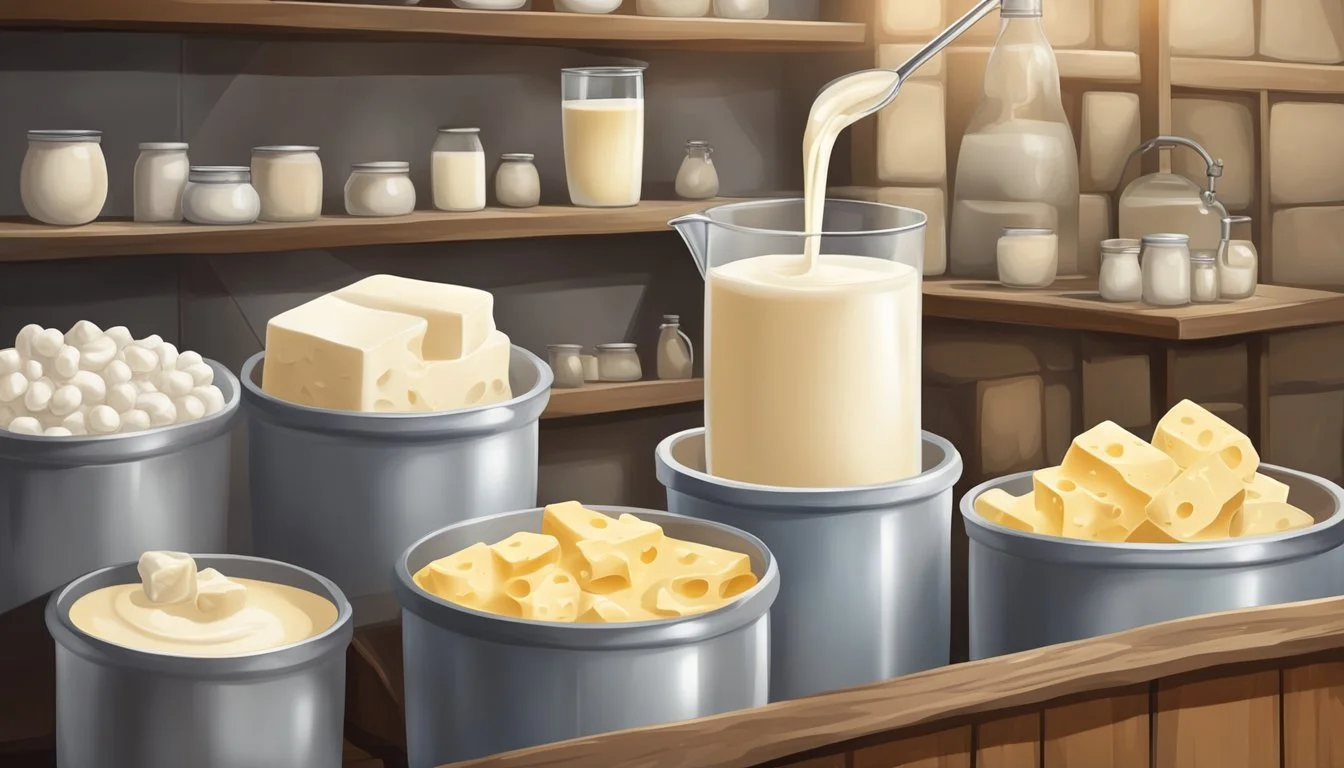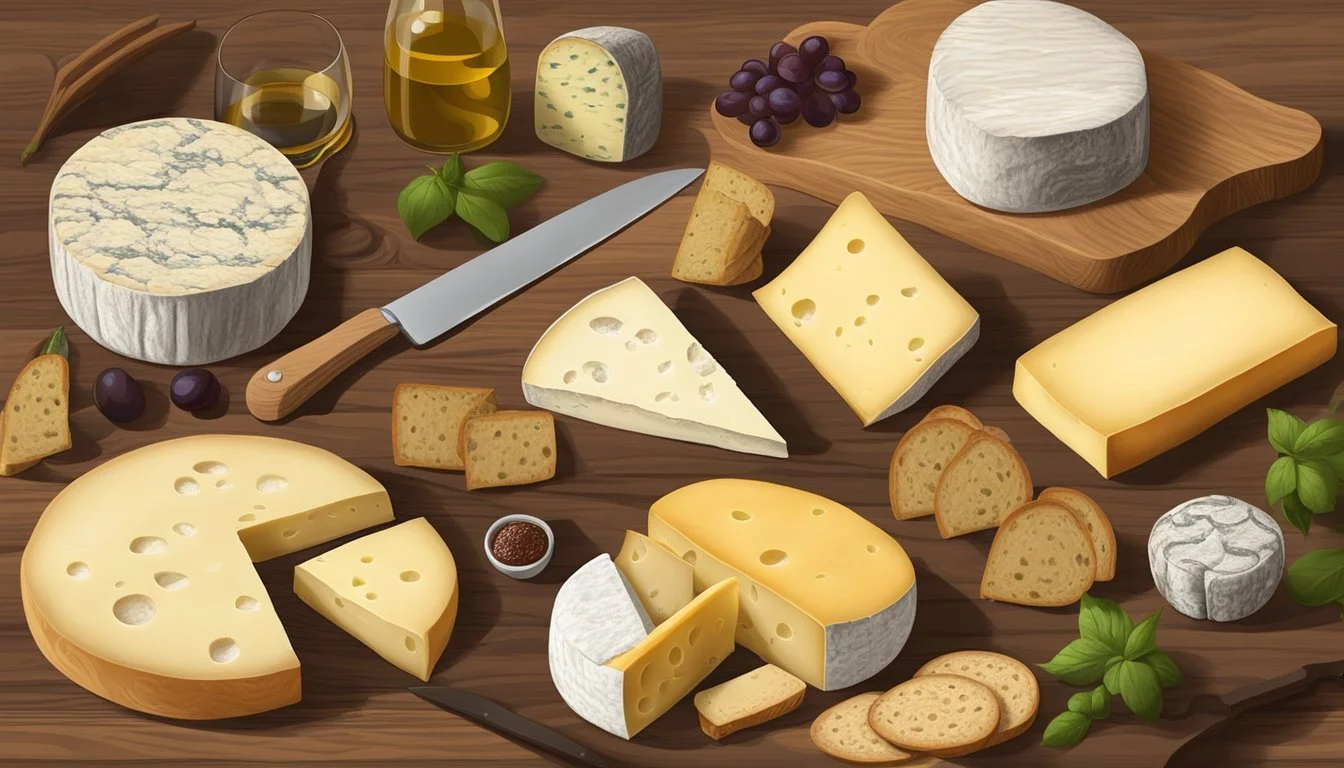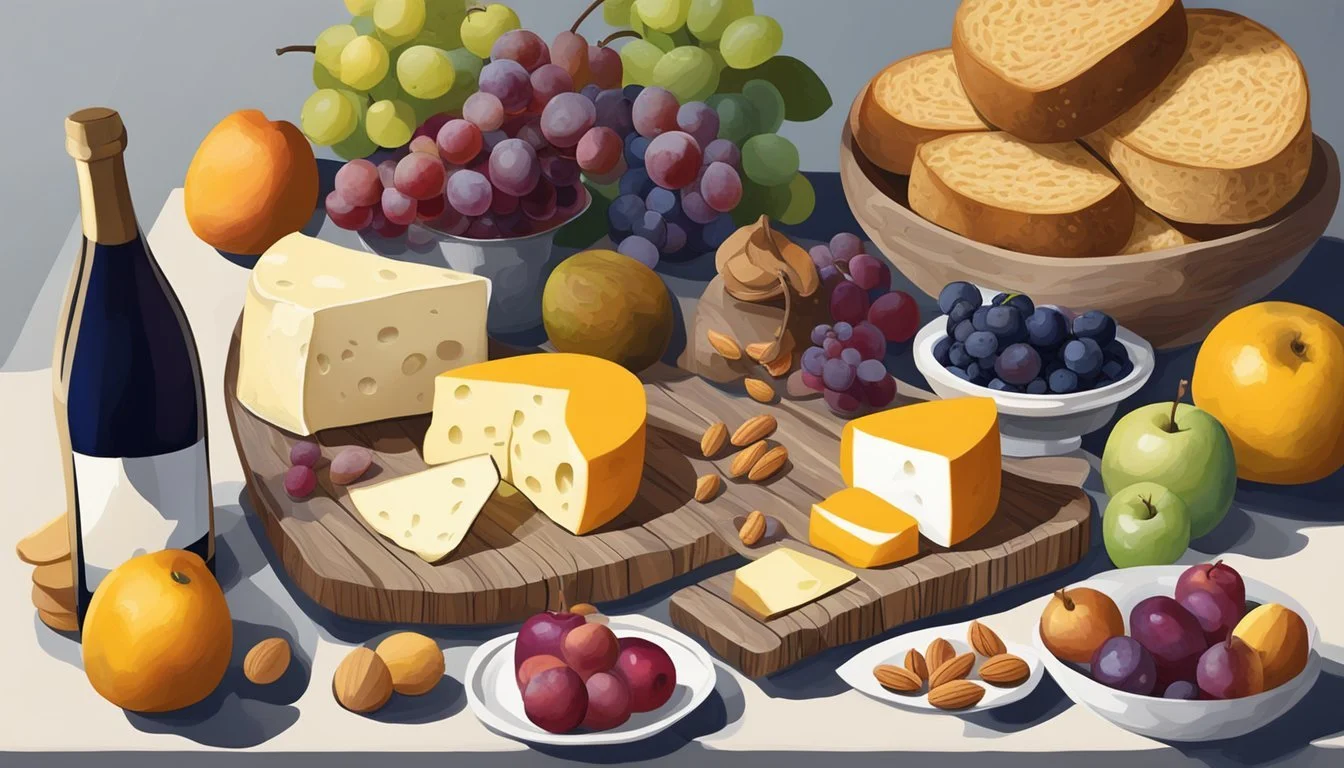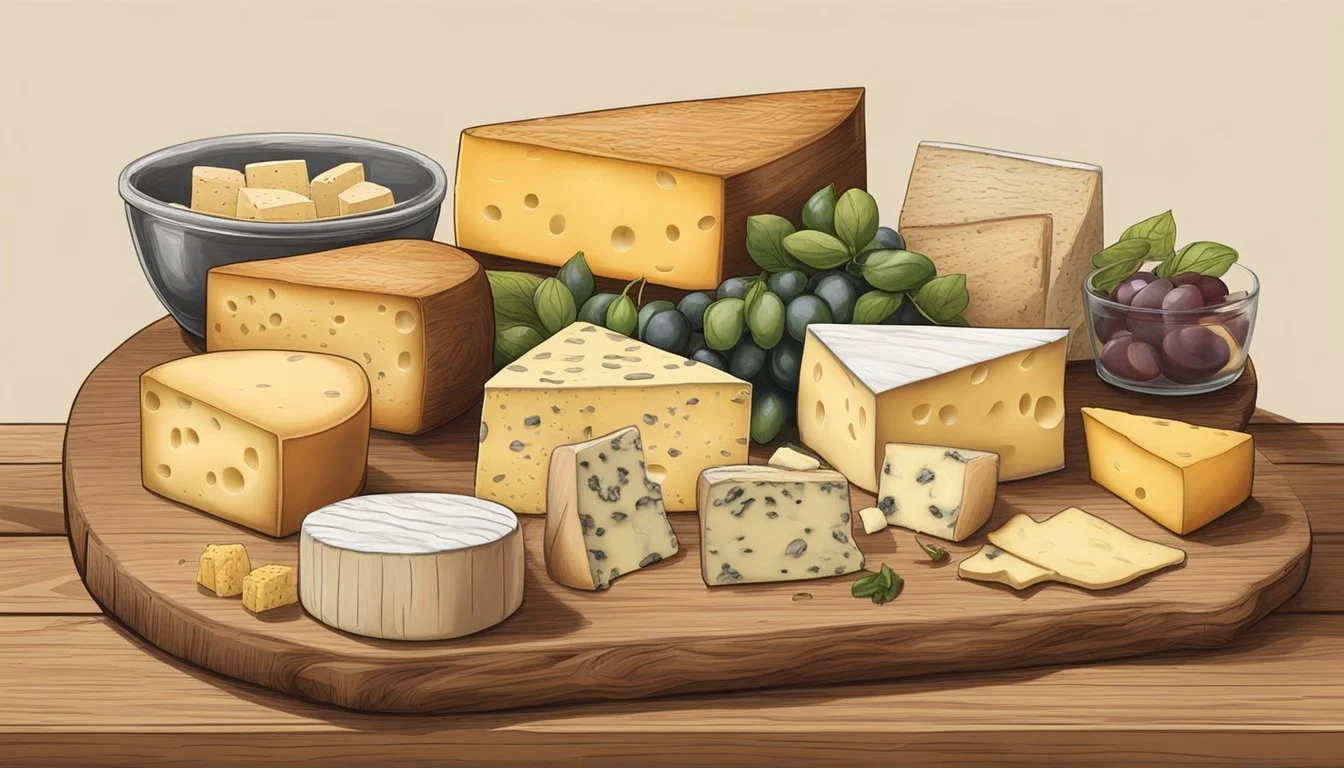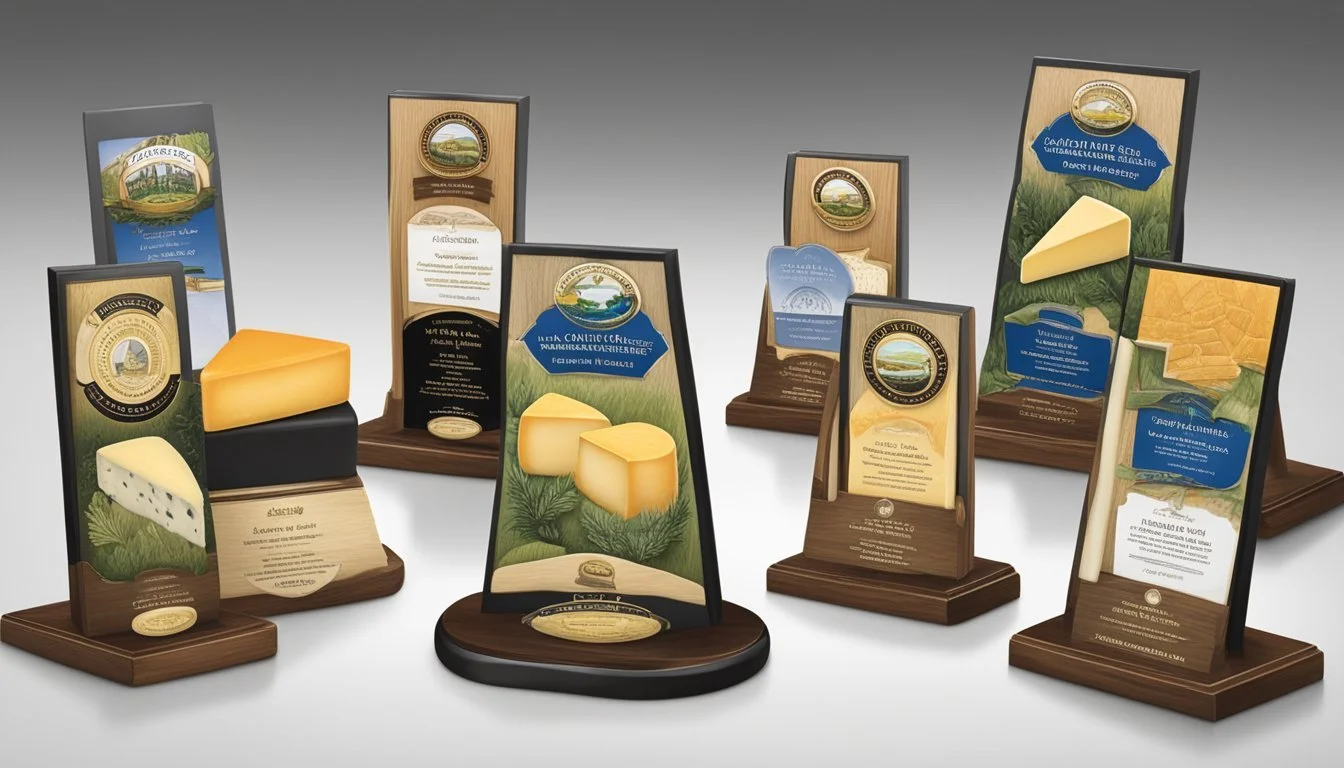Virginia Artisan Cheese
A Guide to the State's Finest Handcrafted Delights
Virginia has emerged as a noteworthy player in the American artisan cheese (how long does cheese last?) scene. Emphasizing a commitment to quality and locality, Virginia cheesemakers take pride in their craft, producing a diverse array of cheeses that reflect the unique terroir of the region. With nearly 30 cheesemakers spread across the state, Virginia’s artisan cheese industry has garnered recognition at national cheese competitions and has been featured in culinary magazines and on television.
Cheesemaking in Virginia is a practice rooted in tradition coupled with innovative techniques aimed at creating cheeses with complex flavors and textures. Many of these cheeses come from small, family-run farms, such as Peaceful Heart Farm in Claudville, specializing in farmstead cheese crafted from the milk of their own herds. These cheeses tell the story of the land and the meticulous care cheesemakers pour into every batch.
Meadow Creek Dairy, operating from the highlands of Virginia, epitomizes the concept of grass-based farmstead cheesemaking, often using milk from specific breeds like the Normande cow to produce distinct flavors characteristic of their cheese. The state’s cheesemakers not only contribute to Virginia's growing reputation for high-quality artisan products but also to the local economy by fostering an appreciation for sustainable and locally sourced food.
History and Tradition of Virginia Artisan Cheese
Virginia's artisan cheese landscape is a blend of historic methods and cultural influences, evolving through time to forge a unique narrative in the craft of cheese-making.
Early Beginnings of Cheese Making in Virginia
The genesis of cheese making in Virginia can be traced back to European settlers who brought their cheese-making skills with them. Tradition has it that these settlers adapted their techniques to the New World, leveraging the fertile Virginian soil to produce their dairies. It was out of necessity and resourcefulness that cheese became a staple food for local communities.
Influence of Immigrant Traditions
Immigrant communities have played a pivotal role in shaping Virginia's cheese-making traditions. Different cultures brought with them distinct styles and knowledge, contributing to a diverse cheese lineage within the state. With each wave of immigrants, Virginia's cheese tapestry gained depth, adopting and modifying recipes with local ingredients to create unique offerings.
Evolution of Artisan Cheese in the State
Artisan cheese in Virginia has seen a robust evolution, particularly in recent years. A surge in the interest for locally-sourced and handcrafted foods has invigorated this industry. Today's cheesemakers are not only preserving the age-old techniques but are also employing innovative methods to expand the array of cheeses available. As a result, Virginia has become known for its quality cheeses, reflective of the local land and the meticulous care taken during production.
The Cheesemaking Process
The creation of artisan cheese in Virginia is a meticulous journey from farm to table, starting with high-quality milk and culminating in an array of aged cheeses (What wine goes well with aged cheeses?), each with unique flavors and textures. This process is an amalgamation of tradition and precise technique.
Collecting High-Quality Milk
The initial step in cheesemaking involves sourcing milk of the highest quality. Virginia cheesemakers typically obtain their milk from local dairies, ensuring freshness and a rich flavor profile. Key considerations include:
Feed: The diet of the cows, goats, or sheep affects the milk's taste.
Health of the Animals: Healthy animals lead to high-quality milk production.
Handling of Milk: Gentle and sanitary collection of raw milk or cream preserves its inherent qualities.
Turning Milk to Cheese
Transforming milk into cheese is a delicate dance of chemistry and artistry. The process includes several stages:
Pasteurization: Although some cheesemakers prefer using raw milk for its depth of flavor, pasteurization is also common to ensure safety by eliminating harmful bacteria.
Culturing: Starter cultures are added to milk, beginning the fermentation.
Coagulation: Rennet or acid sources are introduced to turn the milk into curds and whey.
Cutting the Curd: The size of the curds is essential; smaller curds lead to harder cheeses.
Draining: Whey is drained, and curds are processed according to the type of cheese being made.
Pressing: Curds are pressed to expel remaining whey and to form the cheese.
Aging and Curing Artisan Cheeses
Aging is the phase where cheese develops its distinct identity. Factors influencing this stage are:
Temperature: Usually conducted in cool, humidity-controlled environments.
Time: Ranging from a few weeks to several years.
Treatment: Some cheeses are washed, brushed, or turned to develop the rind and flavor.
Virginia's artisans are known for their dedication to the craft of aging cheese, which results in exceptional products that reflect the local terroir.
Types of Artisan Cheese in Virginia
Virginia's artisan cheese scene showcases an impressive variety of high-quality cheeses made from cow, goat, and sheep milk. These cheeses reflect the state's dedication to traditional cheese-making techniques and are gaining recognition for their flavor and craftsmanship.
Cow Milk Cheeses
In Virginia, cow milk cheeses are renowned for their rich taste and variety. Artisan cheesemakers across the state produce a range of cow milk cheeses from the full-flavored cheddar to softer varieties. Meadow Creek Dairy specializes in raw milk cheese from grass-fed cows, offering a healthy and ecologically friendly option. Examples include:
Cheddar: Aged for a distinctive, sharp taste.
Gouda: Mild Dutch-style cheese, often found in two-pound wheels, such as those from Our Lady of the Angels Monastery.
Goat Milk Cheeses
Goat milk cheeses from Virginia are prized for their tangy flavor profile and creamy texture. Small-scale producers focus on creating cheeses that highlight the quality of milk from locally raised goats. Such offerings include:
Chevre: Soft, fresh cheese with a signature tang.
Feta: Brined for a bold and salty presence.
Sheep Milk Cheeses
Sheep milk cheeses, though less common, are also present in Virginia's artisanal cheese landscape. They are typically rich and complex in flavor due to the high fat content in sheep milk. Sheep milk cheeses frequently include:
Roquefort-style Blue Cheese: Pungent with a creamy yet crumbly texture.
Pecorino: Hard and salty, perfect for grating over dishes.
Profiles of Notable Virginia Cheese Makers
Virginia is home to a variety of exceptional cheese makers who have honed the art of cheese making. Emphasizing local ingredients and traditional techniques, these artisans are creating noteworthy and acclaimed Farmstead Cheese.
Meadow Creek Dairy
Meadow Creek Dairy is a family-operated farm renowned for its Farmstead Cheese, indicative of Virginia's terroir. They manage a closed herd, which means all their cheese comes from cows exclusively born and raised on their land. Their artisanal products reflect a commitment to sustainability and the seasonality of cheese making.
Georges Mill Farm Artisan Cheese
Another gem in the Virginia cheese-making landscape is Georges Mill Farm Artisan Cheese. Run by a family dedicated to their craft, their cheeses are a direct product of their own goats raised on the farm, ensuring a rich, farm-to-table experience. They stand testament to the artisanship of small-scale, local dairy production.
Other Family-Operated Creameries
Virginia’s cheese scene also includes a myriad of other family-operated creameries that contribute to the state's rich dairy heritage. Each creamery brings its unique touch to artisanal cheese, crafting products that showcase their individual philosophy toward dairy farming and cheese production. From the use of specific breeds of cows or goats to the implementation of age-old aging techniques, these creameries add to the diversity and quality of Virginia's cheese portfolio.
Sustainable Farming and Local Presence
In Virginia, sustainable farming methods are closely entwined with the artisan cheese industry, promoting eco-friendly practices and bolstering local economies. This commitment to sustainability not only benefits nature but also enhances the quality and character of the local cheese produced.
Integration of Sustainable Practices
Peaceful Heart Farm and Meadow Creek Dairy exemplify the integration of sustainable practices into daily operations. At Peaceful Heart Farm, they use time-honored techniques with their Normande cows' milk to handcraft farmstead cheese, which ensures minimal waste and maintains the natural balance of their surroundings. On the other hand, Meadow Creek Dairy adopts a farm-to-cheese approach with their grass-fed cows and raw milk cheese production, emphasizing ecological friendliness.
The Ag District’s Locksley Farmstead Cheese Company further illustrates this integration by managing a 412-acre sustainable working farm. They raise various breeds of dairy cows such as Brown Swiss and Jersey while focusing on lessening their environmental impact.
Contribution to Local Economy and Community
Artisanal cheesemakers in Virginia, many approaching 30 in number, have become a significant part of the state's local economy. They're recognized not only throughout the localities but also nationally, with features in magazines, cookbooks, and television shows. These cheesemakers help sustain rural communities by providing jobs and preserving farming heritage.
Partnerships with Local Businesses
The collaboration between Virginia cheesemakers and local businesses creates a robust support system that mutually benefits the entire community. Virginia-made cheeses often reflect the characteristics of the local land, which local restaurants and retailers are keen to showcase. By partnering with nearby businesses, cheesemakers can ensure their products reach a wider audience while supporting the local economy.
Health Benefits of Consuming Virginia Artisan Cheese
Virginia's artisan cheese offers a range of health benefits, primarily due to its nutritional content and potential advantages for digestive health. These aspects are integral to understanding the value of incorporating artisan cheese into a balanced diet.
Nutritional Value of Artisan Cheese
Artisan cheese from Virginia is lauded for its high-quality protein, which is essential for muscle repair and growth. These cheeses often contain a rich array of essential nutrients, including calcium, which is crucial for bone health. For example, a slice of Virginia cheddar could provide a substantial portion of the recommended daily intake of calcium.
Key Nutrients in Artisan Cheese:
Protein: Essential for muscle repair
Calcium: Vital for bone density
Vitamins (A, B12): Important for various bodily functions
Digestive Health and Raw Milk Cheese
Raw milk cheese, which is less processed than many commercial varieties, could offer additional benefits for digestive health due to the presence of probiotics. These beneficial bacteria support a healthy gut microbiome and can aid in digestion and potentially improve immunity.
While research is ongoing, the probiotics found in some raw milk cheese varieties made in Virginia are similar to those in other fermented foods known to promote gut health.
Possible Benefits for Digestive Health:
Probiotics: Support gut health
Less Processing: Raw milk retains more natural enzymes
Flavors and Profiles of Virginian Cheeses
Virginia's artisan cheeses offer a diverse palette of flavors, influenced by the local terroir and cheese-making traditions.
Influence of Pasture on Flavor
The pasture where livestock graze plays a crucial role in shaping the profile of Virginia's artisan cheeses. Cheese derived from 100% grass-fed cows, such as those from Peaceful Heart Farm, typically exhibit a fresh, grassy flavor. The local flora, comprising various grasses and plants, imparts distinct notes to the milk, which, in turn, influences the cheese's taste. For instance:
Grassy Creaminess: Cheeses infused with the essence of Virginia’s season-driven pastures.
Nutty Undertones: A result of diverse pasture compositions.
Aroma and Texture Characteristics
Virginia's cheese aroma and texture are as varied as their flavors:
Aroma: Ranges from mild and milky to pungent and earthy. Each cheese carries an aroma signature, like the "funky, nutty" descriptor often associated with the state's cheeses.
Texture: Can vary widely from smooth and silky to firm and crumbly. For example:
Soft and Spreadable: Fresh, artisanal goat cheeses from farms like Caromont Farm.
Firm and Alpine-style: Cheeses like Pinnacle, which has a dense, chewy texture.
Pairing with Foods and Beverages
Artisanal cheeses from Virginia pair beautifully with various foods and beverages:
Cheese Type Food Pairing Beverage Pairing Fresh, Grassy Creams Fruits, Nuts (how long do nuts last?) Light White Wines Nutty, Aged Cheeses Cured Meats, Olives Full-bodied Red Wines Funky, Earthy Ones Robust Salads, Pickles Craft Beers or Ciders
The cheeses take on the characteristics of the local land, making them prime candidates for perfect pairings, elevating both the culinary experience and the appreciation of Virginia’s unique terroir.
Awards and Recognition
Virginia's artisanal cheeses have garnered attention for their exceptional quality, receiving both national and international accolades that have significant impacts on brand recognition and demand.
National and International Accolades
Virginia's artisanal cheesemakers have made a pronounced mark in the cheese industry, with their products gaining praise on multiple prestigious platforms. Notably, these cheeses have secured a series of awards and positive mentions in national magazines, culinary books, and television programs. Artisan cheeses from Virginia are celebrated for their unique flavor profiles, which are often attributed to the meticulous craftsmanship of the cheesemakers and the terroir of the region.
Key Awards:
Cheese counters across the country have recognized Virginia's artisanal cheese quality.
Specific varieties have achieved accolades that highlight their excellence on a broader scale.
Impacts on Brand and Demand
The recognition through awards has had a direct impact on the brand and demand for Virginia's artisanal cheeses. Cheesemakers experience increased visibility and prestige, often leading to heightened interest from consumers and retailers. This upward trend is not only beneficial to the individual brands but also contributes to the overall growth of the state's artisan cheese industry.
Brand Visibility: Awards elevate the profile of cheesemakers, leading to greater consumer awareness.
Demand Surge: Accolades can drive consumer demand, with specific award-winning cheeses seeing notable upticks in sales.
Experience Virginia Cheese
Virginia's artisan cheese scene offers a rich sensory experience for aficionados and casual consumers alike. Through cheese tasting tours, local purchasing opportunities, and various cheese-related events, enthusiasts can explore a diverse selection of handcrafted cheeses.
Cheese Tasting Tours
Artisan cheese producers across Virginia, specifically in the Southwest region, often welcome visitors for tours and tastings. Peaceful Heart Farm in Claudville extends an invitation to cheese lovers to explore their farmstead operation by appointment. Here, visitors can directly engage with the cheesemaking process and savor the farm's offerings. To ensure a personalized experience, it’s advisable to call ahead and schedule an appointment.
Purchasing Local Cheese
Patrons looking to purchase Virginia's artisan cheeses can support local cheesemakers by buying their products directly from farm stores or at farmer’s markets. Georges Mill Farm, a family-operated dairy farm, suggests that potential visitors make an appointment to buy their Artisan Cheese. This approach not only provides fresh, flavorful cheese but also boosts the local agricultural economy.
Where to Buy:
Farm stores (appointment recommended)
Local farmers' markets
Events and Cheese-Related Activities
Throughout the year, Virginia hosts cheese-related events that might include tastings, pairings, and educational workshops. Attendees learn about the craftsmanship behind cheese production and have the opportunity to taste and compare various artisan cheeses. Information on upcoming events can typically be found on individual farm websites or local tourism boards dedicated to Southwest Virginia.
Supporting the Virginia Cheese Industry
The Virginia cheese industry benefits greatly from strategic marketing efforts and educational initiatives. They are carefully designed to promote local cheesemakers and their high-quality products.
Affiliate Programs and Marketing
Virginia cheesemakers often partner with affiliate programs to increase their visibility and sales. For instance, affiliate links on food blogs and culinary websites, such as Onlyinyourstate, drive traffic to the cheesemakers' own websites or product pages. Such collaborations are strategic, mutually beneficial for both the cheesemakers and the affiliate websites, and provide consumers easy access to purchase artisanal cheeses.
When these cheesemakers participate in affiliate programs like the Amazon Associate program, they leverage the widespread reach of one of the world's largest online marketplaces. This enables them to display their products to a vast audience outside their local geography, increasing potential sales and consumer awareness.
Educational Resources and Workshops
Cheesemakers and dairy farms in Virginia also prioritize educating the public about their craft. They achieve this by offering workshops and publishing educational resources. These workshops often include hands-on experiences, teaching participants about the cheese-making process from milk to maturation.
Educational resources, often available both online and in print, allow enthusiasts to learn about cheese varieties, pairing suggestions, and the significance of supporting local dairies. In addition, by explaining the intricacies of cheese production, these resources cultivate an appreciation for artisanal methods, prompting consumers to make informed decisions when purchasing cheese.
Local Artisan Cheese in Cuisine
Virginia's artisan cheeses play a significant role in the state's cuisine, adding unique flavors to both classic and contemporary dishes. They provide a delightful fusion of taste when paired with other local produce and meats.
Recipes Featuring Local Cheeses
Virginia cheeses can transform ordinary recipes into gourmet experiences. A simple grilled cheese sandwich can be elevated by using a sharp Virginia cheddar, complemented by sweet caramelized onions, and a touch of Dijon mustard. In another dish, a creamy macaroni and cheese can be enriched with a mixture of local cheeses such as Gouda from Our Lady of the Angels Monastery and a robust blue cheese, baked to perfection with a crisp, golden crust.
For meat enthusiasts, a succulent pork tenderloin (What wine goes well with pork tenderloin?) can be stuffed with herbed goat cheese from Georges Mill Farm, creating a melody of flavors when combined with a hint of garlic and a sprinkle of fresh thyme. When it comes to desserts, a homemade cheesecake using fresh, local cream enhanced with a swirl of artisanal caramel showcases the versatility of Virginia's dairy offerings.
Virginia's Culinary Identity
The state's culinary identity is deeply intertwined with its artisanal cheeses. These cheeses are more than just an ingredient; they are a celebration of Virginia's rich dairy agriculture and the craftsmanship of its cheesemakers. A warm beef Wellington (What wine goes well with beef Wellington?) can gain depth and character with a layer of local blue cheese melting over the tender filet, wrapped in buttery puff pastry. A traditional Virginia cobbler, often made with fresh, seasonal fruits, reaches new levels of indulgence with a dollop of whipped cream enhanced with a hint of soft local cheese, offering a savory balance to the sweet dessert.
Furthermore, broths and soups gain a luxurious texture and flavor with the introduction of a Virginia artisanal cheese. A velvety French onion soup, topped with a thick slice of crusty bread and melted local cheese, is a comforting classic that showcases the ability of these cheeses to complement and elevate the regional bounty.
Conclusion
Virginia's landscape has lent itself naturally to the production of exceptional artisan cheeses. The cheese industry in this state stands on a foundation of tradition, with many cheesemakers adhering to time-honored methods. These producers utilize the rich, grass-fed milk from local breeds such as the Normande and Jersey cows, ensuring a premium quality product.
The defining characteristics of Virginia's artisan cheeses—be it the rich creaminess or the bold flavors—are a testament to the region's terroir. Virginia cheesemakers have effectively showcased how local land influences the taste and quality of their cheeses. The efforts of local cheesemakers like Dany Schutte also highlight the level of expertise within the industry, contributing further to the state's reputation.
Here are key takeaways regarding Virginia's artisan cheese industry:
Quality: Virginia's cheesemakers prioritize high-quality, grass-fed milk.
Tradition: Producers often follow traditional cheese-making methods.
Local Influence: The unique characteristics of local land imbue distinct flavors.
Expertise: Certified Cheese Professionals™ like Dany Schutte enhance industry standards.
In embracing both the old and the new, Virginia's artisan cheese industry is not merely continuing a rich legacy but is also carving out a niche in the gourmet food sector. Its steady rise in popularity serves as evidence that traditional processes paired with local resources can yield products that resonate with consumers on a national scale.


